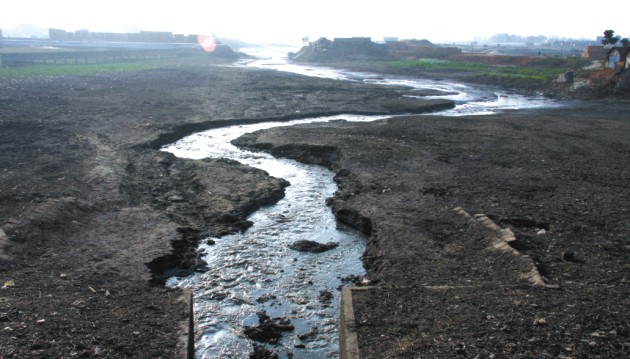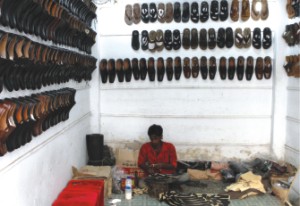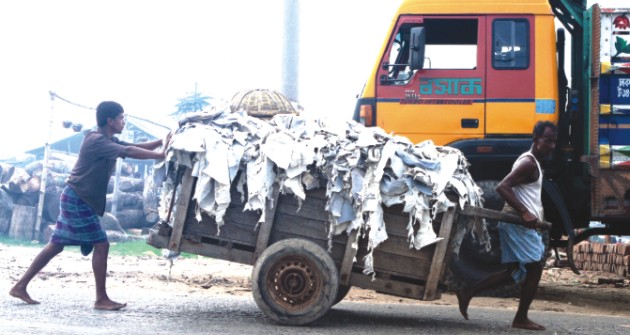|
Special Feature
Relocation Sandwiched in Excuses
Tamanna Khan
“Kobay theikai to huntasi factory gulan Savar-e niya jaibo, kintoo jai nai to. Gele ar ki koru; Savar-e giya kam korum. Chakri to korte hoibo (We have been hearing about the shift of the factories for some years now, but nothing has happened so far. If the factories do shift we would go there and work. We need to work in any case),” says Aklima Begum, a worker at the packing section of one of the 200 tannery factories of the Hazaribagh area of the capital.
Concern for the environment, saving the Buriganga and the residents near Hazaribagh from the stench and pollution of the wastes and chemicals of the tanneries had led the government in 2003 to sign an agreement with the tannery owners to relocate the industry to Hemayetpur, Savar. Besides, there was pressure from the international community to make sure that leather and leather goods exporters install effluent treatment plants in their factories to reduce pollution.

Rejected leather of the tanneries is used by small businesses for making local leather goods. Photo: zahedul i khan
However, the two major tanners associations in Bangladesh, Bangladesh Finished Leather, Leather Goods and Footwear Exporters Association (BFLLFEA) and the Bangladesh Tanners Association (BTA) noted that none of the tanneries in the Hazaribagh area had the capacity to set up the plant individually and asked for government's cooperation. Under the circumstances, the government not only agreed to set up a Common Effluent Treatment Plant (CETP) but also decided to relocate the industry in Savar.
Although originally scheduled to be complete by December 2005, it took the government almost two years since the signing of the Memorandum of Understanding (MoU) only to acquire and partially develop 200 acres of land in Savar out of the 400 acres demanded by the tanners. The tender for the main element of the project, the CETP was not floated before 2006, and did not receive any response till the third bid call in February 2007. Industry Minister Dilip Barua explains the problem that took place after the CETP job was awarded to a bidder: “ The lowest bidder did not get the job as they did not meet the technological requirements; so they filed a case. The case has been vacated (made void)only recently.”
While legal difficulties prevented the setup of the CETP, revision of the project proposal during the tenure of the caretaker government added to the delay. “In the original MoU, the government had pledged to bear the entire cost of building the CETP. During the tenure of the caretaker government, they changed the PP (project proforma) and raised the project cost,” says Md Shaheed Ahmed, Chairman of the BTA. He also alleges that the then caretaker government did not take their consent while changing the project proforma. However, when Engr Md Mahbubur Rahman, Project Director of Dhaka Tannery Estate Project (DTEP), Bangladesh Small and Cottage Industries Corporation (BSCIC), the implementing authority of the project, was asked about the change in the project proposal without the consent of the other parties, he declined such allegations. He said that the project committee includes representatives of both BTA and BFLLFEA; therefore such allegations are groundless.
The increased cost of the project has become a headache to the tannery owners since the government has asked them to share the cost of building the CETP. “The government is saying that we have to share the cost over 20 years. If we share the cost then our production cost will go up and it will be difficult for us to compete in the international market,” informs Shaheen. The industries minister however defends the government's stance saying that it is the era of private entrepreneurs; while government has allotted and developed land, the tannery owners should at least come forward to share in the cost of CETP. The minister opines that the tannery owners are reluctant to move because of some hidden agenda of a few vested interest groups in Hazaribagh.

Defying a HC order some poultry feed producers are still operating in the area, emitting dangerous gases and adding to the stench of the rawhide and polluted environment. However law enforcers of the Hazaribagh area prevented the photographer of the Star to take pictures of poultry feed producers that are still burning the untreated waste materials.
On the other hand, Md. Shaheen, speaking on behalf of the tannery owners, appears to be quite interested in the move. “Since 2007, we have started making the payments for the 154 plots allotted to us in Savar, through yearly installments.” He noted that the delay is not helping the tanners in any way, as there is no scope of expanding the industry in the Hazaribagh area. According to the Environment Act the Industries Ministry cannot issue permission to any new factories that pose threat to the environment, without a pollution reducing or eliminating device. As a result no new tanneries were open in the Hazaribagh area since the last 10 or 12 years, says Shaheen. Mizanur Rahman, owner of Chowdhury Leather and Corporation Ltd, says, “ If we stay here, buyers who are aware of environmental issues will not buy goods from us. There is pressure from foreign buyers.”
In spite of their seeming interest about the relocation, not a single owner has so far started building any facilities in Savar. They bring up the issue of their compensation that has not been agreed upon yet. “We had estimated a loss of 1089 crore taka because there are some heavy machines which we will not be able to shift. Those will be destroyed here. There are some fragile wooden drums that cannot be shifted as well. In 2006, a committee headed by the Industries Secretary had recommended that 250 crore can be given as compensation. However keeping the price hike in mind, we have requested the finance minister last year to reconsider the amount,” says Shaheen.

The chemicals and solid wastes of the tanneries directly go into the Buriganga through the sewer.
Besides the compensation package, the tannery owners have also asked for rescheduling of their present bank loans through interest exemption and shifting the mortgages against the new industries at Savar. Lack of workers' colony, hospital, school, and police station for the security of the industry are among the other reasons shown by the BTA chairman for not making any shifting attempts. On the contrary, DTEP project director, Rahman informs that the infrastructure for a police station and a fire brigade has already been built and they will soon invite the concerned authorities to set up their offices there. The industries minister justified the absence of the workers' colony, hospital and school saying that Savar is a commercial area and does not lack such facilities. Furthermore, public transport facilities from Dhaka to Savar make such demands pointless.
The tannery owners also appear to be concerned about the industries that have developed based on their by-products for example the glue and poultry feed factories that use the solid waste of the tanneries. “As per our agreement, the small local tanners who supply leather to the local shoe factories were also entitled to plots. However they were not given any,” says Shaheen. However, small business owners like Mohammad Ismail, running a small leather-belt shop near the big factories plan to buy the leather from Bongshal if the present tanneries are relocated; while Wahidul, a local shoemaker plans to shift to Savar with his family.
 |
Small shoe factories that have grown up in Hazaribagh may close down or move to Savar or buy their raw material from Bongshal. |
The poultry feed factories, a major polluter, releasing dangerous gases by burning the tanned solid waste of the tanneries without further processing, has a High Court (HC) ruling against their activity. On July 26, 2010, HC has directed the government to shut down, for three months, those factories and business enterprises at Hazaribagh in the capital which are responsible for use of raw tannery waste as ingredients in producing poultry and fish feed. However, some of the poultry feed factories are still operating in the area, emitting dangerous gases and adding to the stench of the rawhide and polluted environment. It remains a mystery why the law enforcers of the Hazaribagh area prevented the photographer of the Star to take pictures of poultry feeds that are still burning the untreated waste materials.
Once the case of the CETP tender has been vacated, the government has asked for a time extension from the court for relocation. The High Court has given the government time to complete the tender process and awarding by February next year. This time a standard 2- step tender has been floated whereas the technical abilities of the bidder will be evaluated before asking for the financial bid. Barua is hopeful that once the job is awarded, the CETP will be completed within two and a half years. In the meantime, he expects the tanneries to start relocation by building their facilities in the allotted plots; otherwise allocation will be cancelled, warns the minister.
For the residents of the area, the wait has been too long. “Since my childhood I have seen how the waters of the Buriganaga have changed its colours, how many varieties of fish have disappeared. At times, the stench becomes unbearable. Yet, many people, especially the slum-dwellers have in fact taken these problems for granted. They have become used to the problems,” says a sarcastic Zahid, a resident of Hazaribagh.

Photo: Zahedul I Khan
Yet sarcasm is not the answer to a problem that is being delayed because of excuses from both the tannery owners and the government. To save our environment and our rivers, all parties whether public or private have to come to an agreement.
Copyright
(R) thedailystar.net 2010
|

